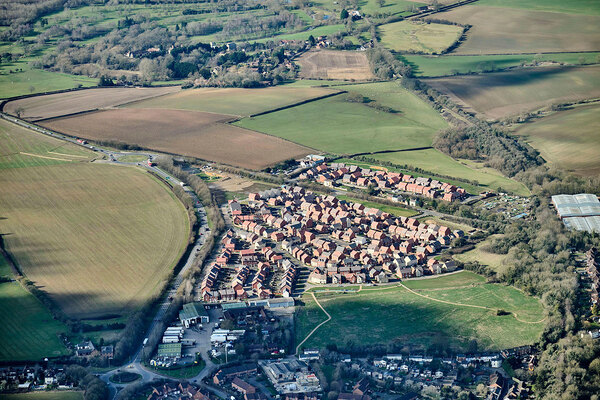Delivering cost-effective decarbonisation for rural and off-grid homes
Biomass heating is a practical solution to homes at risk of being left behind by net zero policies, writes Neil Holland, managing director at Y Pellets and chair of the UK Pellet Council
The UK has the oldest housing stock in Europe, with 75% of homes built before 1975. Compared to urban areas, rural homes tend to be larger, older and more likely to be detached, making decarbonisation of their heating more challenging.
Many of these properties rely on polluting fossil fuels such as liquid petroleum gas, heating oil, and, in 59,000 cases, coal, resulting in significantly high carbon emissions.
In this context, wood pellet boilers present a practical and effective solution. Modern systems are highly efficient, delivering high-temperature heat that allows existing radiators and pipework to remain, making retrofitting simpler and more cost-effective. Compared to gas, the carbon savings per rural home are substantial, with two heating oil homes generating as much CO2 as three homes with gas.
While heat pumps are widely promoted for domestic decarbonisation, they are not always viable for rural homes. According to the Climate Change Committee, the average cost of retrofitting a home with a heat pump exceeds £26,000, and for older rural homes, this cost can be several times higher. These technical and financial barriers explain why so many rural properties are still classified as “hard to heat”.
These limitations underline the importance of government policy remaining technology-agnostic as we try to meet our net zero goals, as technologies like biomass can offer immediate and effective decarbonisation potential.
Common retrofit challenges
Upgrading to biomass requires careful planning and expertise. It’s vital to hire an experienced installer trained on a specific boiler brand, ideally with local references to support you in the future. Choosing a reliable European brand is recommended, since these are generally more efficient and can often integrate with systems like solar PV for summer water heating.
Proper system sizing is crucial, too: an undersized boiler won’t heat effectively, while oversizing wastes energy. Always choose the largest pellet store the property can accommodate, preferably with an automatic auger feed. Correctly stored pellets remain good for nine to 12 months and buying during summer months can lower costs even more.
Installations typically take only a few days but ensure you familiarise yourself with the controls. Many modern boilers use apps to set schedules, monitor performance and send alerts about when to empty the ash bin.
Ash removal is minimal, about seven grams per kilo of pellets burned, roughly the weight of three paperclips, and needed only every few months. The organic ash can even be used as garden fertiliser.
Tackling fuel poverty and local jobs
Investing in a quality biomass boiler provides 15-20 years of sustainable and reliable heating. Pellet prices are stable and predictable, typically set with separate rates for summer and winter, helping households avoid the extreme price fluctuations often seen in oil markets.
Beyond price stability, biomass heating enhances fuel security through robust domestic forestry supply chains. Locally sourced, ENplus A1-certified wood pellets provide energy security.
What’s more, this vertically integrated industry supports rural economies by creating local jobs and promoting sustainable forestry management, offering a distinct advantage over reliance on imported fossil fuels. Your investment thus delivers long-term cost-effective carbon savings while fostering economic and environmental benefits in rural communities.
Unlocking community heating potential
There’s also huge potential for biomass community heating schemes in social housing developments. Rather than heating each home individually, a large, centralised biomass boiler plant can deliver heat and hot water through insulated pipework to multiple dwellings, communal areas and even nearby facilities like community centres or schools – a common practice across Europe.
This approach can simplify management, reduce installation and maintenance costs per unit and enable group purchase of fuel. The scale of a community system can enhance fuel security contracts and make funding for upgrades or decarbonisation projects easier to secure.
Policy and the path forward
Wood pellet heating offers a cost-effective, proven and practical route to net zero heat for thousands of off-grid homes. To realise this potential at scale, policy frameworks must be flexible and supportive of rural housing’s unique needs.
This should include targeted funding beyond just electrification, alongside investment in expanding UK pellet manufacturing to ensure a secure, affordable domestic supply. By embracing diverse, place-based solutions, the UK can deliver fair, affordable and genuinely low-carbon heating for rural communities, without leaving anyone behind.
Neil Holland, chair, UK Pellet Council



